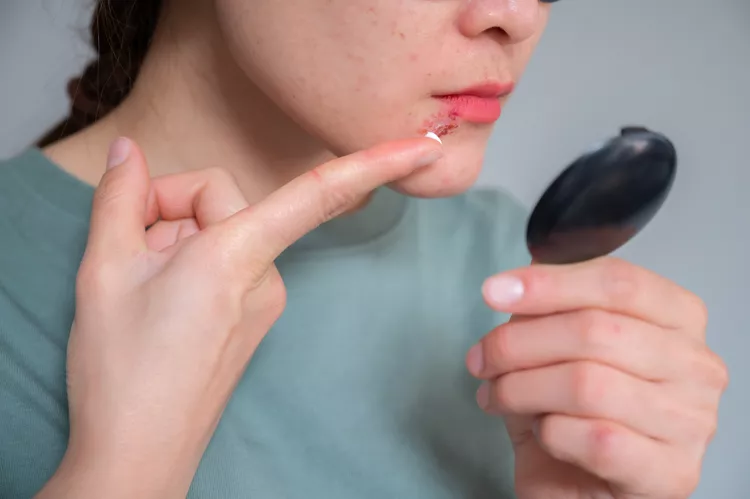| SYMPTOMS OF HERE | SYMPTOMS OF Pimples |
| Painful, itchy, burning or stinging skin | Red, inflamed skin |
| Small blisters filled with a clear liquid | Tender lump with white or black greasy pus |
| Scab formation | Painful cysts under the skin |
| It is located around the lips and mouth | It is found anywhere on the face |
Cold sores and pimples are different skin conditions with different causes and treatments. If you are concerned that you have any of these conditions, knowing the difference between them can help you better understand what you are experiencing.
Various causes
Herpes is caused by the herpes simplex virus (HSV-1), a virus that is easily transmitted between people. Pimples are not caused by a virus, but by bacteria.
The most common cause of pimples is increased sebum, an oily substance produced by your skin glands. Sebum can clog hair follicles, causing an increase in the bacteria that naturally grow on your skin and cause pimples.
Hormones can play a role in sebum production and acne breakouts.
Herpes are contagious
The herpes simplex virus (HSV-1) that causes cold sores is contagious and can be spread to others through kissing and sharing drinks and towels.
The herpes virus is most contagious when you have herpes, but it can spread to others even when you are asymptomatic. If you engage in oral sex while you have herpes, you can transfer the virus to your partner’s genitals.
Unlike herpes, pimples are not contagious. The bacteria that cause pimples are naturally present on your skin.
Different treatments
Although cold sores and pimples may look similar, their treatments are very different.
There is no cure for herpes simplex virus (HSV-1). The virus occasionally becomes active and produces cold sores, but usually remains inactive in your nerve cells. Your doctor may prescribe antiviral medications for herpes, such as Valtrex (valacyclovir).
Over-the-counter (OTC) products, such as Abreva (1-Docosanol), and vitamins such as L-lysine can help reduce the duration and discomfort of cold sores. If left untreated, herpes usually goes away on its own.
Treating pimples is different. Your doctor may prescribe an antibiotic or retinol-based medicine to help reduce the bacteria that caused your breakout.
If you have ovaries, your doctor may also prescribe hormonal birth control or testosterone blockers to reduce the production of sebum that encourages acne-causing bacteria. There are also many OTC treatments, such as face washes, that help clear your skin.
Effect on different parts of the body
Cold sores are usually found around the mouth and lips, but can spread to the eyes and genitals.
Pimples can appear on the back, shoulders and face. They usually do not spread to the genitals and are not present in the eyes, lips or mouth.
Cold sores and pimples can sometimes be difficult to tell apart due to several overlapping similarities. If you have any skin condition, you are not alone.
Both conditions are common
Cold sores and pimples are common skin conditions that affect people of all ages. Up to 80% of adults have herpes simplex virus (HSV-1), and about 30% will have recurrent herpes.
Pimples are also common – over 85% of adolescents and the elderly develop pimples. Approximately 25% of people assigned female at birth and 10% of people assigned male at birth will experience adult acne.
Similar prevention strategies
Although cold sores and pimples have different underlying causes, certain lifestyle changes can help prevent both conditions. Psychological stress and an unbalanced diet can increase the risk of attacks and outbreaks.
Some steps you can take to reduce these factors and improve overall health include:
Both can affect your mental health
Living with skin problems can affect your mental health. The stigma surrounding cold sores can cause cold sores, especially if the attacks are frequent. Acne can be difficult to treat, and living with acne long-term can affect your self-esteem and cause anxiety and depression.
Cold sores and pimples are completely separate skin conditions that you can have at the same time.
Although cold sores are caused by a virus and pimples by bacteria, some risk factors can make both worse at the same time. For example, a period of high stress can cause an increase in pimples and the appearance of cold sores.
Differentiating between the two conditions requires you to understand the unique symptoms associated with each, such as the location of the blemish and the presence of blisters.
Herpes usually goes away on its own in about 1-2 weeks. Minor breakouts can also be addressed at home with facial hygiene practices and OTC products.
If you experience increased pain or discomfort in any of these conditions, or if symptoms are long-lasting, see your doctor. A primary care physician can usually diagnose and treat these conditions. They can refer you to a dermatologist (skin specialist) for specialized care.
Cold sores and pimples are common skin conditions with different causes, symptoms and treatments.
Cold sores are caused by the herpes simplex virus (HSV-1) and usually appear as fluid-filled blisters around the mouth, often accompanied by pain or itching. They are contagious and can be spread by kissing or sharing objects.
Pimples are caused by increased sebum production that helps bacteria grow in clogged hair follicles, leading to red, inflamed skin or cysts. They usually form on the face, back or shoulders.
While cold sores are treated with antiviral medications, pimples can be treated with antibiotics, retinoids, or OTC products. Both conditions can affect mental health and can be worsened by stress, diet and hygiene. Although they are separate states, it is possible to experience both at the same time.


